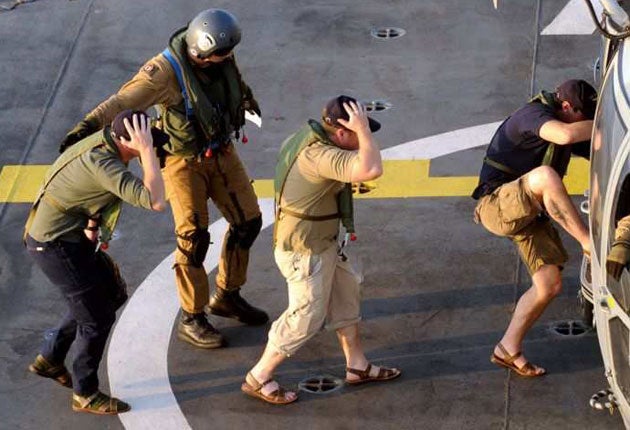British security guards jump ship to escape Somali pirates
Men rescued from sea but Indian crew taken hostage / Deployment of foreign navies fails to curb attacks

The limitations of private security in protecting shipping from the rise of Somali piracy were cruelly exposed yesterday as three British operatives threw themselves overboard into the Gulf of Aden to escape hijackers.
The guards, from a UK-based shipping protection company, had to be rescued by a German navy helicopter, and they left the Singapore-operated MS Biscaglia unable to defend itself despite its "protection" and a distress call to a nearby warship. The pirates overran the Liberian-flagged chemical tanker, and kidnapped its mainly Indian crew of 28. The hijacking could have major implications for other firms trying to cash in on the piracy crisis.
Just over a week ago, the controversial US contractor Blackwater announced it was moving into the pirate-infested waters between Somalia and Yemen with a private gunboat carrying an attack helicopter.
So far this year, there have been 97 attempted hijackings off the lawless Horn of Africa. A massive deployment of foreign navies to the vital shipping lane has so far failed to halt or even slow the rate of attacks, with new ships taken almost daily.
A spokesman for Anti-Piracy Maritime Security Solutions (APMSS), a shipping protection company based in Poole, Dorset, said the tanker was attacked in daylight by five pirates on a high-speed launch. Despite the presence of the security men, the pirates boarded the tanker. APMSS, which advertises "non-lethal" security solutions, said their guards had been "under fire". A spokesman said: "Basically if they didn't [jump], we would probably have been picking three bodies out of the water." The Dorset firm was set up by a former pilot, Nick Davis, and offers a range of defence measures for merchant shipping ranging from long-range acoustic devices, designed to emit ear-splitting noise to thermal imagers and night sun torches. None of those appears to have deterred the pirates.
The spokesman said the firm's employees had reason to believe they would have been killed. "These three guys had spent quite a considerable amount of time trying to repel these pirates, so they could clearly identify them, and they were the only three British aboard. There are 26 Indians and two Bangladeshis and three white guys, so it's not rocket science."
The spokesman refused to reveal the identity of the men although the British embassy in Nairobi said that they were alive and well aboard a French naval vessel.
Germany and France are just two of the Nato countries running patrols in the area; an international coalition of other nations has ships in the Gulf including India, Malaysia and Russia. Their main role is to escort merchant ships and respond to distress calls. The dangers of the militarisation of the Gulf were exposed this week after the Indian navy appeared to have sunk a Thai fishing trawler after mistaking it for a pirate "mother ship".
Several organisations, including the East African Seafarers Programme based in Mombasa, Kenya, believe a hijacked Nigerian vessel is being used by pirates to launch attacks on shipping further out to sea. Noel Choong, head of the International Maritime Bureau's piracy-reporting centre in Malaysia said ships "must continue to maintain a 24-hour vigil and radar watch so they can take early measures to escape pirates. Even though there are patrols, the warships cannot be everywhere at the same time."
The crew of the Biscaglia join the estimated 300 other seamen being held by Somali pirates, including the 25 crew of the Saudi-owned supertanker, the Sirius Star, the largest ship taken by pirates. The "very large crude carrier" class vessel carrying $100m of oil is at anchor off the pirate port of Eyl, and its owners are close to agreeing a ransom of £9m, sources say.
Few companies will admit to dealing with the pirates but some $30m is estimated to have been paid in ransoms this year alone, and the pirates themselves claim to be receiving an average of $2m for each seized ship.
Greek authorities said a Greek-owned cargo ship seized by the pirates more than two months ago had been released on Thursday and that all 25 crew members are unharmed.
Join our commenting forum
Join thought-provoking conversations, follow other Independent readers and see their replies
Comments
Bookmark popover
Removed from bookmarks